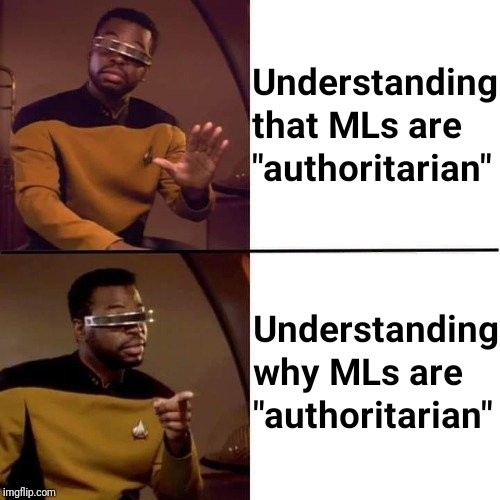this post was submitted on 21 Mar 2024
157 points (92.9% liked)
Memes
4028 readers
2 users here now
Good memes, bad memes, unite towards a united front.
founded 5 years ago
MODERATORS
you are viewing a single comment's thread
view the rest of the comments
view the rest of the comments

That very out of context quote is saying that under capitalism the state is used by the bourgeoisie to advance their common interests, not that the state "is inherently oppressive".
The hurdle a lot of illiterate liberals have to get over when they read Marx is that his use of oppressive isn't a moral assertion, it's a dialectic.
Yes, a state is opressive. It is the oppression of one class for the benefit of another. As long as a state exists, there is an existing class divide in the place that state exists.
Do you think the bourgeoisie care that the state is oppressive? No. Because the current form of the state serves their interests. Should workers care that a bourgeois state is opressive? Yes. Because a bourgeois state will actively sabotage any attempt by the body of labor to free itself.
As long as this dynamic exists (either domestically or internationally) states will continue to exist, and the form of that state will take on the character of the class that controls it.
In "The Civil War in France" Marx directly condems the revolutionaries (though respects their lofty aims) for not taking over the State in Paris. For not opening the banks, exploiting the existing power structure, and then destroying the bridge behind them. The Paris Commune is one of the first direct examples of a suddenly stateless society failing in the face of an organized bourgeois state.
If you want a socialist project to survive, you have to learn from the mistakes of the Parisians and take hold of power and use the oppressive nature of the state to cement the new order or you risk reactionary movements that aren't afraid to wield that oppressive power destroying all you've built.
And this is a hard thing for liberals to get their heads around because it's something that Marx changed opinions on the second he saw what had happened in Paris. Unlike most liberal political economists who are dogmatic in their beliefs and theories, Marx was driven primarily by the state of things and analysis of reality. His theories changed as he saw them practiced.